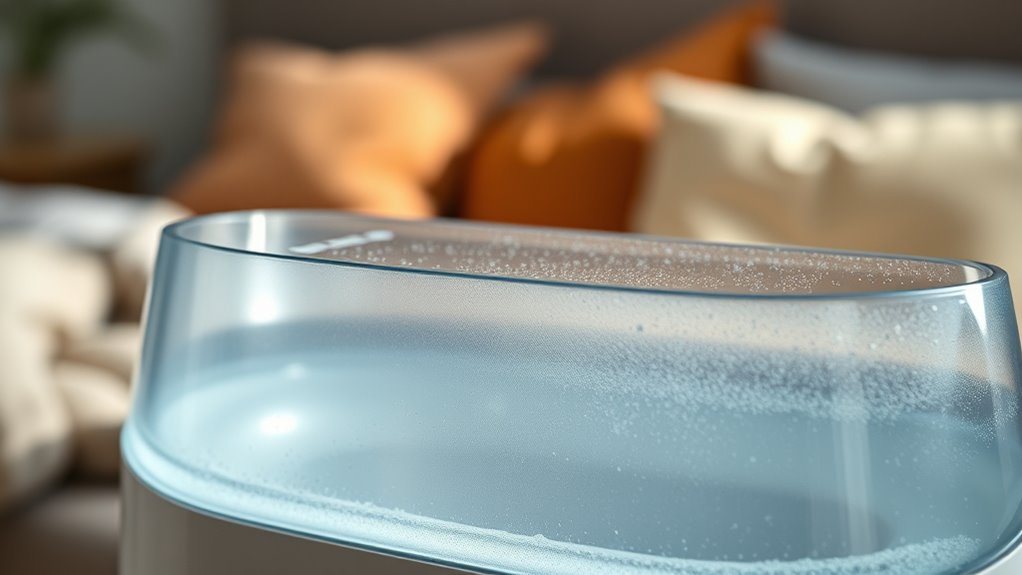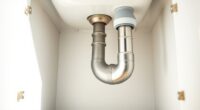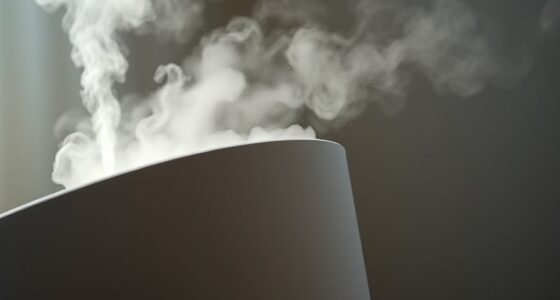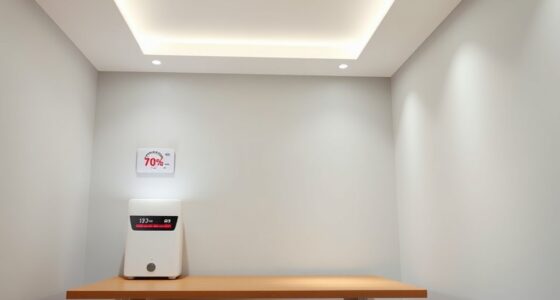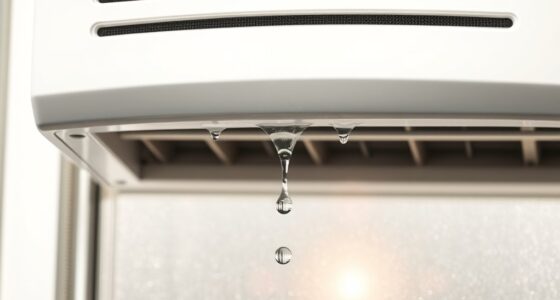A musty smell from your humidifier usually means mold or bacteria are growing inside, often due to dirty filters, stagnant water, or infrequent cleaning. To fix it fast, empty the water, disassemble and scrub the parts with vinegar, then dry everything thoroughly before reassembling. Regular cleaning and filter changes help prevent future odors. Keep exploring for more tips on keeping your humidifier fresh and odor-free.
Key Takeaways
- Bacteria, mold, or mildew grow in damp, stagnant water, causing musty odors in your humidifier.
- Infrequent cleaning and delayed filter replacement promote microbial buildup and odors.
- Visible mold, slimy residues, or cloudy water indicate microbial growth needing immediate attention.
- Regularly clean and dry all parts, replace filters on schedule, and use distilled water to prevent odors.
- Persistent smells despite cleaning may require replacing the humidifier or seeking professional repair.
Common Causes of Musty Odors in Humidifiers

Musty odors in humidifiers often originate from bacteria, mold, or mildew that thrive in damp, stagnant water. If you delay filter replacement, you allow these microorganisms to build up, worsening air quality and increasing the smell. Dirty filters can trap moisture and debris, creating an ideal environment for mold growth. Poor maintenance of your humidifier, such as neglecting regular cleaning or not changing the filter, contributes to this issue. When bacteria and mold accumulate, they emit a musty scent that circulates with the humidified air. To prevent this, replace filters promptly and clean your humidifier regularly. Maintaining good air quality starts with keeping your device free of contaminants, ensuring a fresher, healthier environment in your home. Additionally, understanding personal finance management can help you budget for replacements and maintenance supplies to keep your humidifier clean and functioning properly.
Recognizing the Signs of Mold and Bacteria Growth
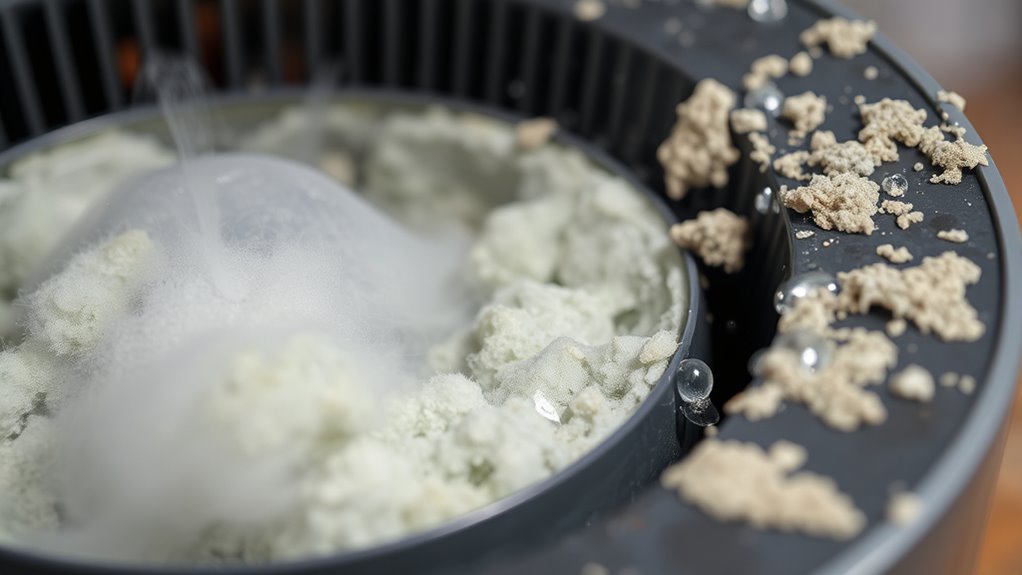
Identifying early signs of mold and bacteria growth in your humidifier can help prevent unpleasant odors and potential health issues. Look for visible discoloration or slimy residue on the water tank or filter, which indicate bacterial buildup. Unusual musty smells often signal mold presence, especially if water stagnates for too long. Airborne spores released from mold can cause respiratory issues and worsen allergies. Pay attention to persistent odors even after cleaning, as they suggest ongoing microbial growth. If you notice cloudiness or sediment in the water, it’s a sign that bacteria are thriving. Regularly inspect your humidifier for these signs, as early detection helps prevent mold from spreading and keeps your indoor air healthy. Additionally, monitoring the filtration system and ensuring it functions properly can significantly reduce microbial growth.
Step-by-Step Cleaning Procedures to Eliminate Odors
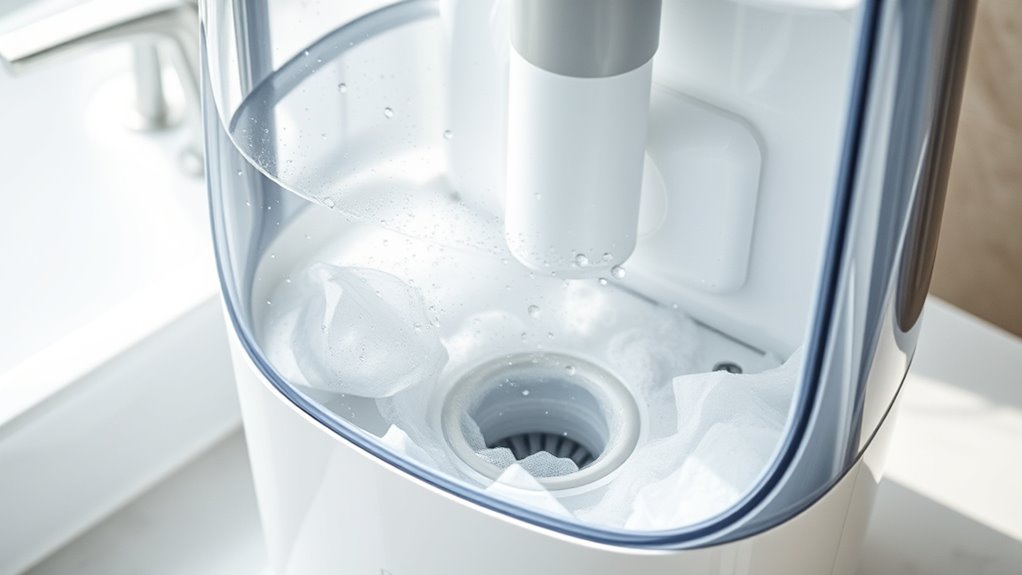
To effectively eliminate odors from your humidifier, start by unplugging the device and emptying any remaining water. Remove the water tank and base, then disassemble removable parts. Use a mixture of white vinegar and water to scrub all surfaces, targeting areas prone to mold and bacteria. Let the vinegar solution sit for 10-15 minutes to break down buildup. Rinse thoroughly with clean water to remove any residue. For stubborn deposits, a soft brush or cloth can help. Once clean, dry all parts completely before reassembling. Proper cleaning not only eliminates musty smells but also boosts air quality improvement in your home. Regular humidifier maintenance like this prevents mold growth and keeps your device odor-free. Incorporating filter replacement into your routine ensures consistent performance and odor control. Repeat this process weekly for suitable results.
Tips to Prevent Future Musty Smells
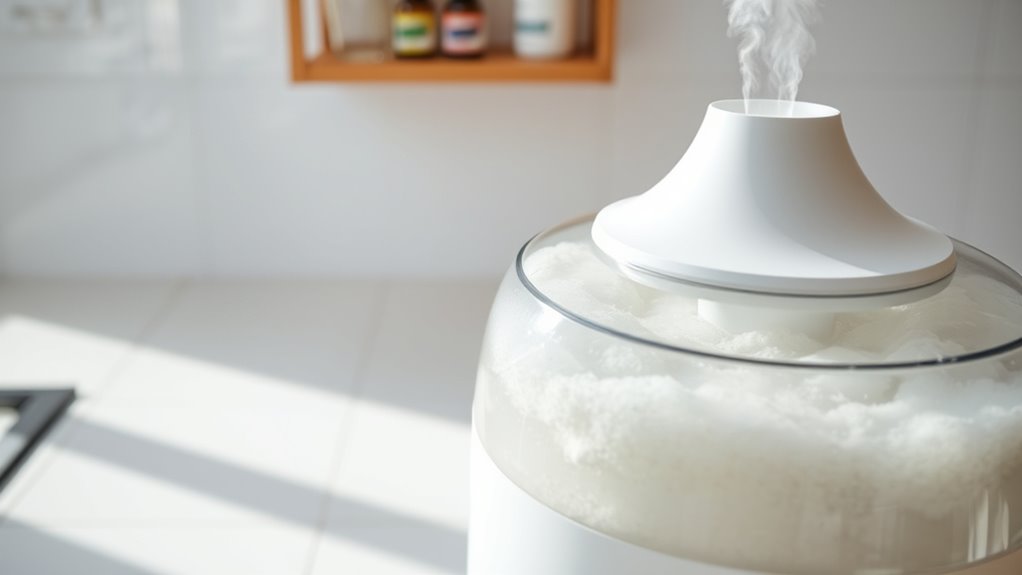
Regular maintenance is key to preventing future musty smells in your humidifier. Consistently clean your device according to the manufacturer’s instructions, removing mineral buildup and mold. Replace filters or pads regularly to guarantee best performance. Keep the water tank dry when not in use and refill with fresh water daily to prevent bacterial growth. Using distilled or filtered water reduces mineral deposits that can contribute to odors. Proper humidifier maintenance not only keeps odors at bay but also improves air quality. Make sure your space is well-ventilated to decrease humidity levels that foster mold growth. Regularly inspecting your humidifier helps catch any issues early, maintaining a fresh scent and healthier indoor air. Incorporating seasonal checklists into your routine can further help identify potential problems before they develop. Consistent upkeep is essential for long-term odor prevention and air quality improvement.
When to Seek Professional Help or Replace Your Humidifier

If your humidifier continues to emit unpleasant odors despite thorough cleaning and maintenance, it may be time to contemplate professional help or a replacement. Humidifiers typically last 3-5 years, so if yours is older or shows signs of wear, replacing it might be best. Persistent musty smells despite cleaning suggest mold buildup or internal damage. Consider professional repair if your device is relatively new and the damage seems fixable. Otherwise, replacing it ensures ideal performance and air quality. Use the table below to evaluate your situation: Dog Quotes for Reflection and Humor
| Situation | Recommended Action | Additional Tips |
|---|---|---|
| Humidifier is over 5 years old | Consider replacement | Invest in a new model |
| Persistent odors after cleaning | Seek professional repair if recent | Evaluate repair costs |
| Device shows signs of mold or damage | Replace immediately | Prevent health risks |
Frequently Asked Questions
Can Using Distilled Water Prevent Musty Smells in Humidifiers?
Using distilled water can help prevent musty smells in your humidifier because it’s free of minerals and impurities that cause buildup. However, water quality isn’t the only factor; regular filter maintenance is essential to keep mold and bacteria at bay. Even with distilled water, you should clean your humidifier frequently and replace filters as recommended to avoid odors and ensure healthy, humidified air.
How Often Should I Replace the Filter in My Humidifier?
You should replace the filter in your humidifier every 1 to 3 months, depending on usage and water quality. Follow your device’s maintenance schedule for peak performance. Regular filter replacement prevents mold, bacteria, and musty odors, ensuring clean, healthy humidity. Keep an eye on signs like reduced mist or a musty smell, and replace the filter promptly to maintain a fresh, odor-free environment.
Are There Natural Remedies to Eliminate Mold Odors From Humidifiers?
Think of natural remedies like a breath of fresh air clearing out mold odors from your humidifier. You can try white vinegar or hydrogen peroxide—they’re your first line of defense, acting like gentle cleaners. Regular mold prevention, such as daily rinsing and drying, keeps mold from taking hold. These simple steps help eliminate musty smells naturally, ensuring your humidifier stays fresh and safe for your home.
Does Using Essential Oils in My Humidifier Cause Odors?
Using essential oils in your humidifier can cause lingering odors because of essential oil interactions with the device’s components. These oils may create buildup or mold, leading to musty smells. To avoid this, consider fragrance alternatives like specially designed humidifier scents or plain water. If you want a pleasant aroma, opt for natural options that won’t compromise your humidifier’s cleanliness or cause unpleasant odors over time.
What Are the Health Risks of Ignoring a Musty-Smelling Humidifier?
Hold your horses, this is no time for a Jurassic Park rerun—ignoring a musty humidifier risks health. Airborne mold can spread, leading to respiratory infections and allergy flare-ups. Bacteria and fungi thrive in damp, neglected units, worsening indoor air quality. If you don’t clean it regularly, you increase your risk of breathing issues and infections. Stay safe by maintaining your humidifier to prevent these health hazards from taking hold.
Conclusion
To keep your humidifier fresh, you need to clean it regularly, dry it thoroughly, and replace the water daily. To prevent musty odors, stay vigilant, stay consistent, and stay proactive. By understanding what causes the smell, recognizing the signs, and taking quick action, you guarantee a healthier, more comfortable environment. Keep your humidifier clean, keep it odor-free, and keep your indoor air pure for your peace of mind.
